Alice Elizabeth Cliff Scatcherd 1842 - 1906
Alice Cliff was born on 7 November 1842. She was one of 14 children, the 7th child and 4th daughter of Joseph Cliff and Alice Dewhirst.
Joseph Cliff was extremely wealthy. He inherited the Brick & Sanitary Tube Works at Wortley, then purchased Micklefield Colliery. Rowland Winn (of Nostell Priory) persuaded him to expand into ironstone mining; Cliff & Winn opened Frodingham Ironworks. Joseph Cliff married his eldest daughter to William Hirst who had invented a new steel-making process so Frodingham became the first company in Yorkshire to produce steel.
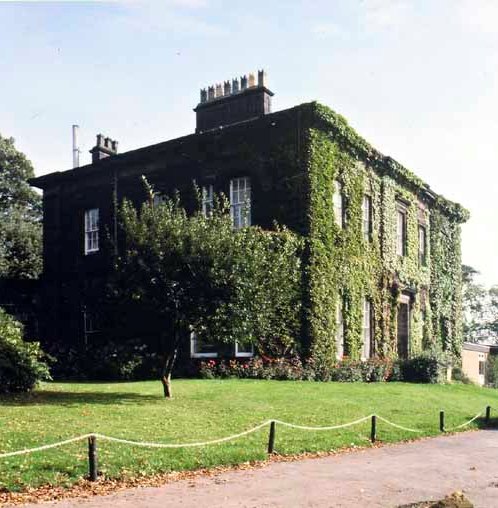
In 1843 Joseph Cliff moved his increasing family to Western Flatts House in Wortley, now known as Cliff House.
The building is Grade 2 listed but it was “destroyed by fire” (arson?) in March 2017.
What were the gardens to the house are now Cliffe Park and Western Flatts Park: the rose garden still survives.
The hall was the full two-storey height of the house and had a magnificent staircase under a glass dome.
There is a story that one of Joseph Cliff’s racehorses is buried under the staircase.
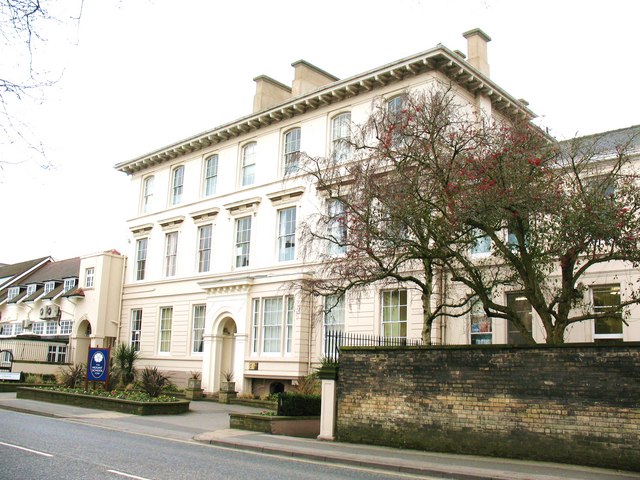
The family were Unitarians and worshipped at Mill Hill Chapel in Leeds. All the Cliff children taught at the adult Sunday School there. Alice, however, spent time at the highly reputed Mount Quaker school in York; she is noted as a scholar there in the 1851 census.
The 1867 Schools Enquiry Commission on Schools for Girls commented: “The curriculum is remarkable for the small proportion of effort devoted to accomplishments and the large share of intellectual culture”.
Alice maintained close links with the Quakers all her life.
In 1871, Alice married Oliver Scatcherd, a solicitor. He was the youngest son of a long-established Morley family who had lived in Morley House since the 17th century.
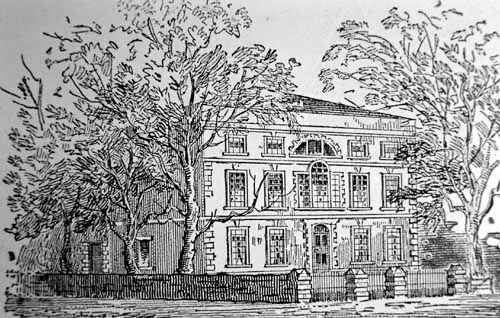
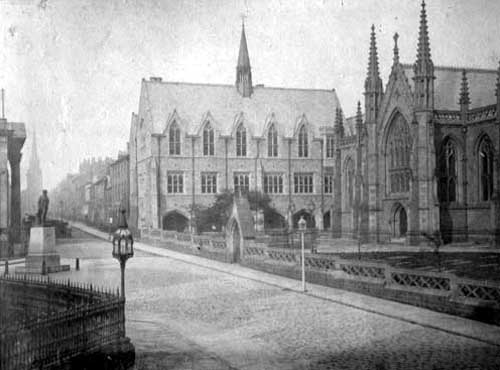
Alice and Oliver were married at Mill Hill Chapel in Leeds on 3 October 1871.
This picture shows Mill Hill Unitarian Chapel with Priestley Hall as it looked in 1871. Priestley Hall opened in 1858 as a school. The Adult Sunday School, where Alice and her siblings taught took place here.
Alice did not promise to “obey” and refused to wear a wedding ring. She believed marriage did much to keep up the subjection of women in our land. It lends the sanction of religion to much that is degrading and wrong in married life.
She seems to have burst into public and philanthropic life as a married woman. Is this why she got married? She and Oliver seem to have been very happy but lived separate lives for most of their marriage.
From 1872 she was attending and chairing meetings of the Leeds Ladies’ Educational Association; the Minutes show her practising her signature until she decided on Alice Cliff Scatcherd.
She joined the newly formed Leeds branch of the Manchester National Society for Women’s Suffrage and, very soon after, was appointed as a committee member, arranging meetings for women voters and their friends in the principal wards of the town.
Meetings were held in schools, halls, libraries, Mechanics’ Institutes and even in supporters’ homes. Audiences “chiefly composed of the working classes” set up suffrage sub-committees of local women to carry out canvassing and political education. Alice became a popular speaker.
Through these meetings, Alice met Ann Ellis, a power-loom weaver from Batley, and Secretary of the local Heavy Woollen Weavers Union.

Mrs Ellis asked Constance Holland and Alice for support organising protests against changes in the Factory Acts which would limit the ability of women, especially married women, to work in the mills and factories. They were aggrieved that restrictions were only to be imposed on women, not on men, and that the workers were not been consulted.
Alice helped to arrange for the women weavers to give evidence to the Leeds MPs about the effects of the proposals.
“On Monday, February 1st, 1874, a numerous deputation of women employed in factories and workshops, headed by Mrs Scatcherd, Miss Holland and several other ladies, had an interview in the Leeds Mercury office with Mr Edward Baines and Mr Alderman Carter (two of the candidates for the representation of Leeds) on the subject of legislative restrictions upon the work of women.”
The Englishwoman’s Review, April 1874
When Ann became the nominated spokeswoman of the striking weavers in Dewsbury and Batley in 1875, Alice introduced her to the organisers of the Women’s Protective & Provident League. However, support from fellow weavers in Wakefield, Lancashire and Scotland meant the all-female strike committee were able to maintain financial independence until the mill owners capitulated.
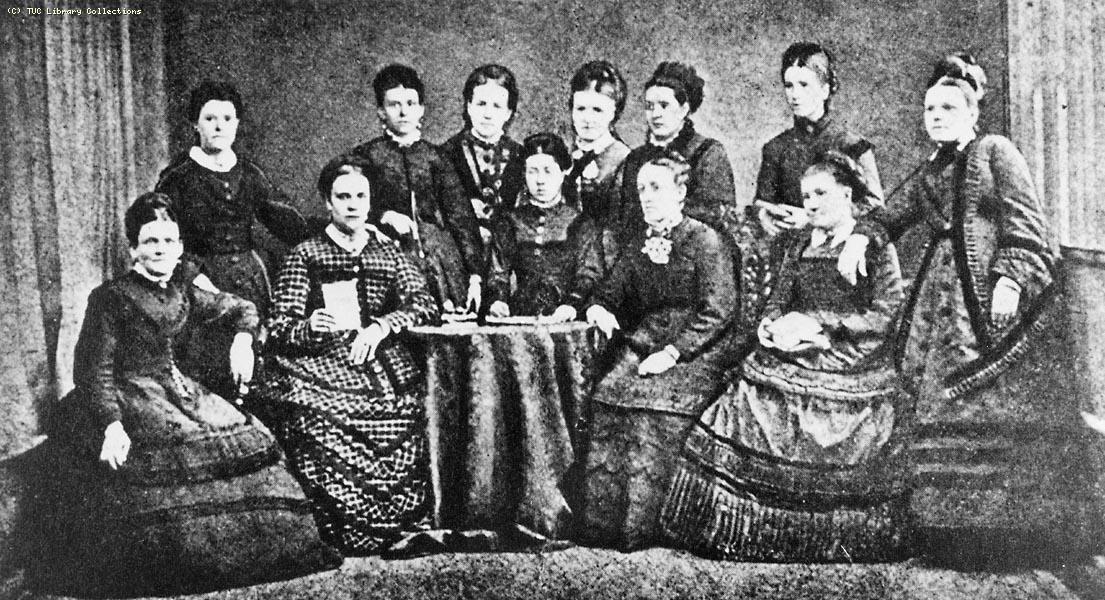
The right of working women to be consulted over their working conditions became a recurring concern. For the rest of her life, Alice supported the work of women’s trade unions, including the Women’s Protective & Provident League (later the Women’s Trade Union League) and the National Union (later Federation) of Women Workers.
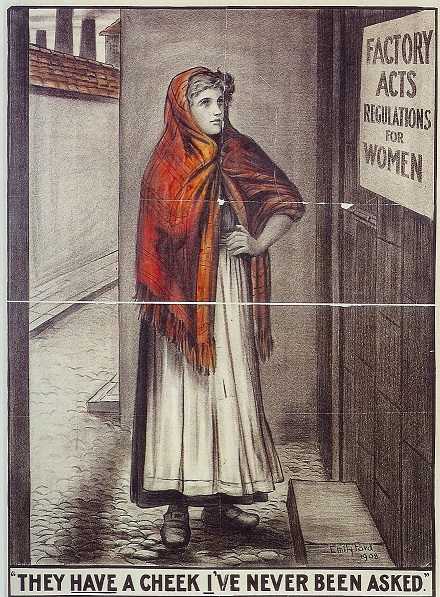
When the Factory Laws dealing with thousands on thousands of women, interfering with their daily lives and saying how long they should work were proposed, these working women were never asked what they thought of them, whether they wanted them, or whether they liked it or did not.
Alice Cliff Scatcherd in the Women’s Suffrage Journal, 1 Jan 1877
Conference of Women Workers 1894
A paper was read on “Women as Factory Inspectors.” The proposed amendment to the Factory Acts, which gave the Home Secretary absolute power to decide what occupations and hours were fit for women, was calculated to injure women workers under the guise of beneficent legislation. Small laundries worked by women were to be crippled to drive the work to steam laundries worked by men. Miners were trying to get the women coal-pickers abolished. Women had been driven out of the bleaching trade and the same agitation was going on about women in lead works. If the government dared to turn tailors out of their employment because it injured their health, they would have to compensate them; but hundreds of respectable women had been deprived of their livelihood and driven into the workhouse.
A woman factory inspector maintained that it was suitable and desirable to open the higher grades of the Civil Service to women, and suggested changes in the department of inspectors. She found that women could speak more freely of their work to fellow women, and of what was needed to better their condition. The work of inspectors was however administrative and not legislative, but the present Factory Acts certainly required extension and alteration.
Letter to Lydia Becker, 31 October 1876
We had 400 women or more and a sprinkling of men. It was really a glorious meeting – the tone enthusiastic and of course I received the usual invitation to go again on WS [Women's Suffrage].
Towards the end it was indeed a merry meeting the slightest joke seemed to set both men and women off – the place rang with clapping and laughter – the men above [there was a meeting of councillors being held simultaneously in an upper room] said “t’wimmin were at it rarely” and lots came down.
Miss Goodall spoke very nicely and I want her name mentioned in WSJ [Women's Suffrage Journal] – also Mrs Burniston’s. They’ve done what women of my class avoid – they’ve gone and sat by me and done the best for the cause. I am so sorry the work is over and wish I had a meeting tonight. I’ve never known a happier week in my life.
“CHARACTER SKETCHES FROM A SUFFRAGE MEETING”
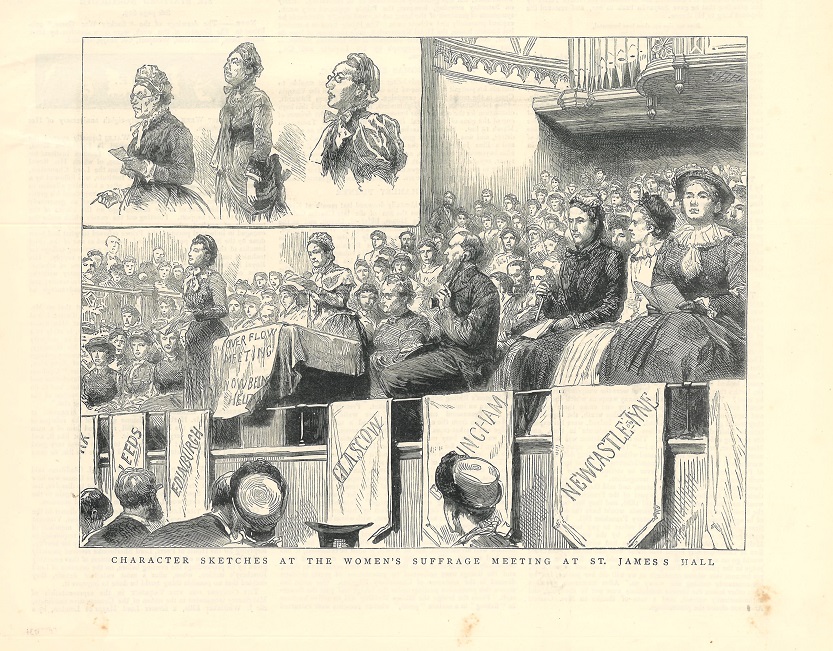
FROM:THE GRAPHIC, 1884
Alice Cliff Scatcherd, the Leeds delegate, stands beside the table, addressing the audience
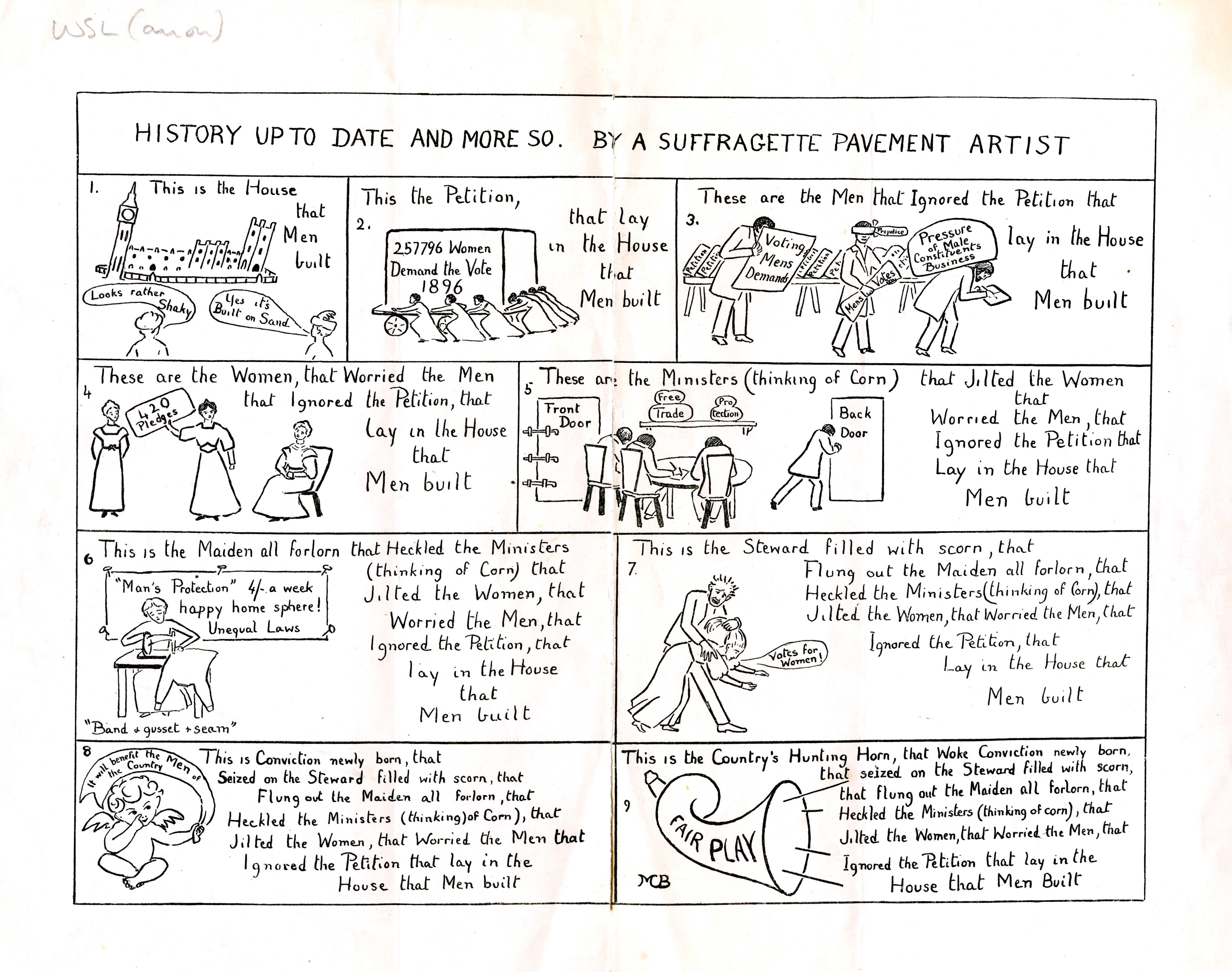
21-29 Virginia Road, Woodhouse, a terrace of substantial through houses. After her marriage, Alice Cliff Scatcherd purchased 27 Virginia Road in her own name and paid the rates on it. The 1891 census shows she employed a live-in housekeeper.
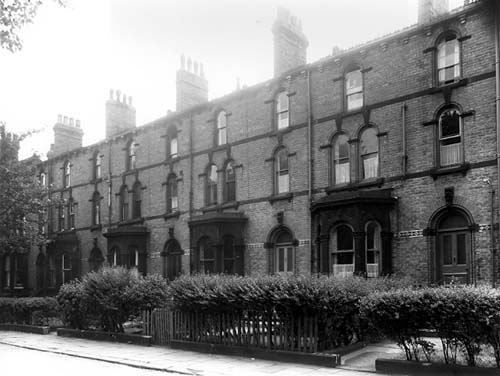
The house was settled on Alice under the Married Women’s Property Act 1870. Despite this, as a married woman, she could not vote in the Leeds School Board or other local elections.
In 1894, Alice gained the local vote in Leeds because she was registered as the ratepayer at this address. She could still not vote in Morley where her husband was the ratepayer.
These properties were demolished in 1962 and the Charles Morris Hall of Residence built on the site.
The Leeds Suffrage Society changed its name to the Yorkshire Society for Women’s Suffrage in 1873 and opened an office in Victoria Chambers at 14 South Parade. Alice took over as Secretary in November 1873 when Catherine Buckton resigned to concentrate on her new elected role as member of the School Board.
In March 1874, the Yorkshire Society merged with the Manchester Society. Alice served on the Committee until 1885. In 1877 she was elected as a member of the Executive Committee responsible for lobbying Members of Parliament.
In summer 1880, the Isle of Man proposed to extend the franchise to its parliament, the House of Keys to all male householders.
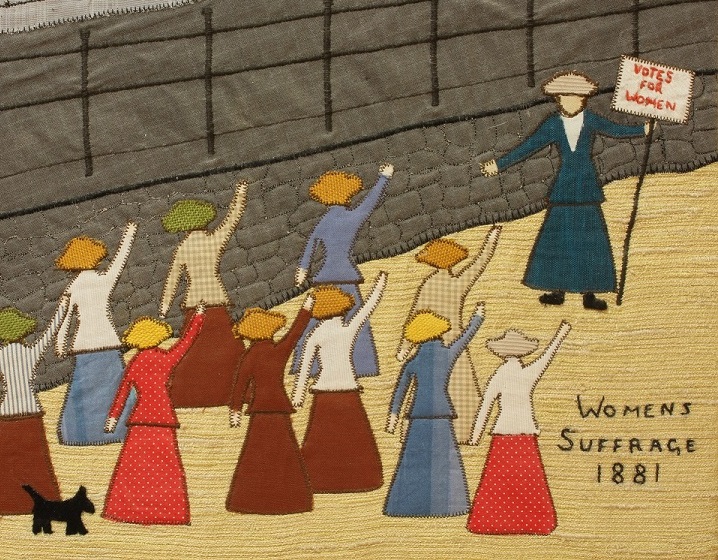
Lydia Becker from Manchester and Alice launched a campaign for the inclusion of suitably qualified women. They held public meetings in Douglas and the major towns, recruiting supporters and establishing women’s suffrage societies. Alice returned in November to hold more meetings as the proposal went to the vote.
Richard Sherwood was the leader of the pro-suffrage group in the House of Keys. He proposed the vote should be given to all women but this was too radical for his colleagues. The franchise was restricted to unmarried women and widows. His proposal to allow women to stand for election was also defeated.
On 31 January 1881, the Isle of Man became the first country in the world to give the equivalent of the Parliamentary vote to (some) women.
The atmosphere of hope and enthusiasm generated by this success persuaded the suffrage societies outside London that the time was right to stage a series of large scale demonstrations: seven in England and two in Scotland. Alice was a speaker and/or chair at six of the English events and both of the Scottish ones, as well as chairing several overflow meetings. The Annual Report of the Manchester Suffrage Society for 1882 singled her out for praise.
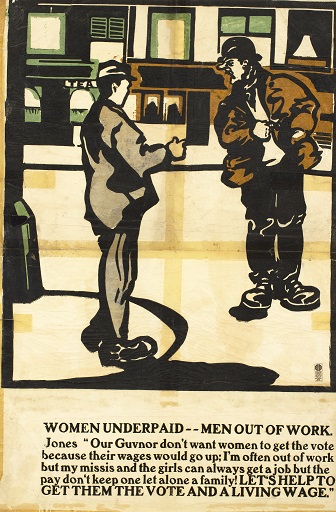
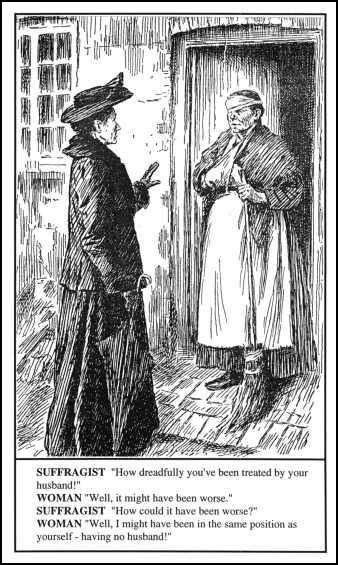
Images courtesy of Women's Library at LSE
ALBERT HALL
SHEFFIELD
WOMEN’S SUFFRAGE
GREAT DEMONSTRATION OF WOMEN
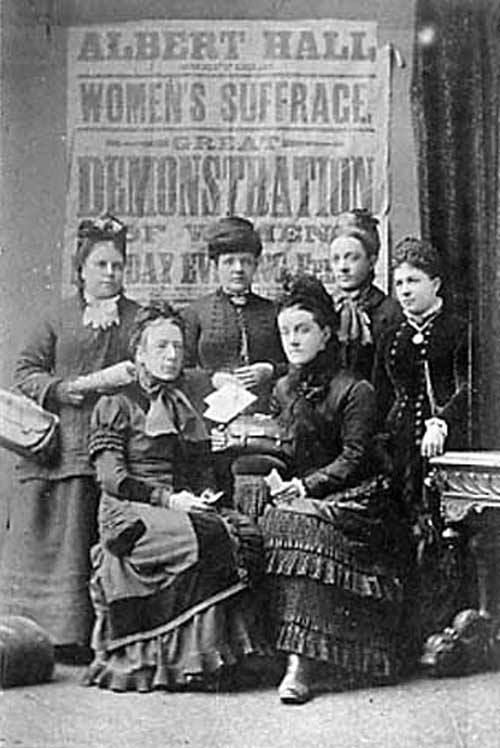
Standing left to right
Mrs McCormick organiser employed by the Manchester National Women’s Suffrage Society 1877-1885 to organise public meetings across the region. In 1889 she joined the Women’s Franchise League and is pictured on the platform when Alice Cliff Scatcherd opened the Quaker Adult School in Morle
Mrs David Vero from Batley which was the most important satellite town for the Leeds Women’s Suffrage Committee and helped take the campaign into the woollen centres
Mrs Ann Ellis from Dewsbury. She was a power loom weaver for over 20 years. During a 6 week lock-out started in Dewsbury in 1875, she organised an all-female Union Strike Committee to negotiate with the employers. Her daughter, born 1877, was named after Alice Cliff Scatcherd
Miss Helena Downing from London. She founded the North London Photographic & Fine Art Repository staffed only by women. In 1879 she was defeated in the Tower Hamlets School Board elections but won a seat as a Poor Law Guardian. The marital home had been settled on her under the Married Women’s Property Act 1870 and she paid the rates but the Returning Officer sued her husband thus disqualifying her from taking her seat.
Seated left to right
Louisa Carbutt
Alice Cliff Scatcherd
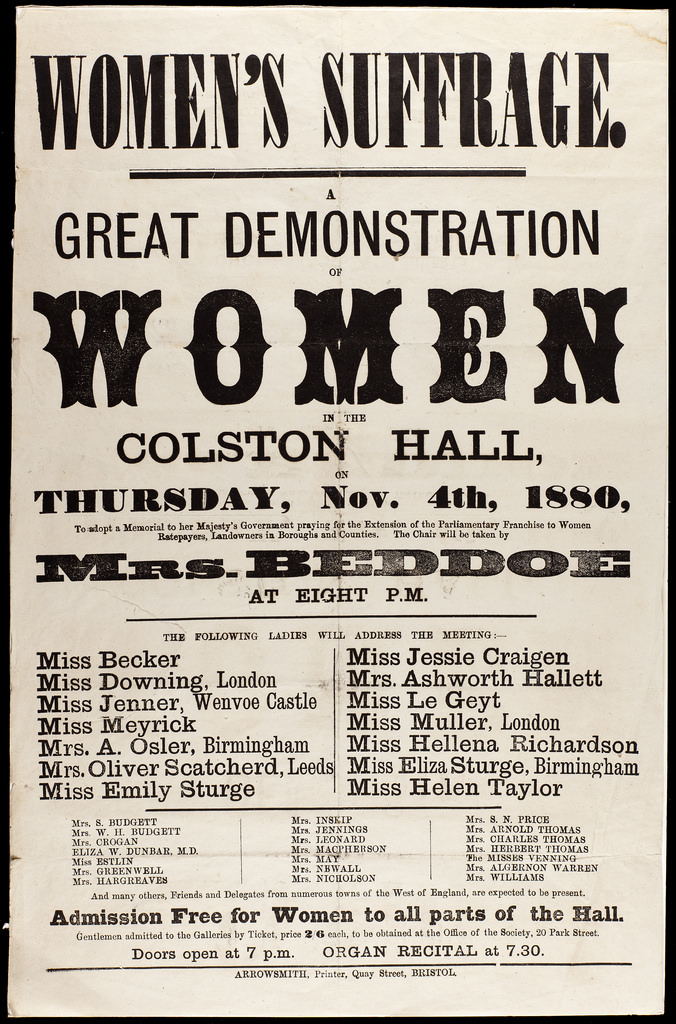
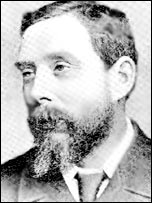
Alice was now one of a committee working with barristers, Richard Marsden Pankhurst of Manchester and Herbert Newman Mozley of Leeds on the drafting of a Married Women’s Property Act. It successfully passed into law in 1882.
Married Women’s Property Act 1882:
- Gave a married woman the right to own, buy and sell her own separate property, inherited or purchased before or after marriage
- Allowed married women to keep and control their own earnings, inherited money and separate savings
- Allowed a married woman to hold stocks and shares in her own name
- Allowed a married woman to sue (and be sued) for debt
In October 1883, Morley Liberal Party appointed Alice as their representative at the National Conference in Leeds.
“Miss Anthony was present at the great Liberal conference at Leeds on October 17, to which Mrs Clark, Miss Cobden and Mrs Scatcherd and several other ladies were duly elected delegates from their respective Liberal leagues. They spoke eloquently in favour of the resolution to extend parliamentary suffrage to women, which was presented by Walter McLaren of Bradford.”
Extract from E Cady Stanton, The Suffragettes, A Complete History of the Movement in 6 volumes, describing a visit to Leeds in October 1883
Alice was one of the suffrage speakers who toured Scotland from October 1884 to January 1885, going right up to the Highlands and Islands as well as visiting the major towns. Before the speaking tour started, Alice spent additional time in Glasgow and Edinburgh helping their suffrage societies set up meetings to educate qualified women in their voting responsibilities when they cast their votes for the first time at the town council elections that November.
In 1888 she went as one of the delegates to the International Congress of Women in Washington.
In January 1889 she was one of the founding members of the Leeds Women’s Liberal Association.
In July 1889 she, Elizabeth Wolstenholme Elmy, Richard Pankhurst and his wife Emmeline, and Jacob & Ursula Bright launched The Women’s Franchise League to campaign for equal political rights for all women, irrespective of marital status. Alice recruited Mrs Ann McCormick from the Manchester Society to be the League’s organising agent. Alice was its main financial resource for many years. Elizabeth Wolstenholme Elmy broke with the League in 1892.
Alice returned to America with Ursula Bright representing the League at the Chicago Exposition 1893, where they addressed a meeting of the American Council of Representative Women.
On 24 April 1894, Alice became the only non-royal woman to open a public building in the nineteenth century. She was invited to lay the foundation stone of the Morley (Quaker) Friends’ Adult School. This demonstrates the esteem in which she was held locally, the links she still maintained with the Quakers and her continuing commitment to education. She taught a highly popular women’s class here for over 10 years and her scrapbook, held at Morley Library, includes letters of thanks from the women she met.
The passing of the Local Government Act 1894 abolished the property qualification for Poor Law Guardians and extended the local vote to all ratepayers including married women. For the first time the working class and especially working class women had a political voice. The passage of this Act owed much to the League’s lobbying. Alice was invited to stand as a Poor Law Guardian in both Morley and Dewsbury but declined.
In the same year, Alice helped to establish the Morley branch of the Cooperative Women’s Guild. She was elected President and served until 1904. Her friend, Isabella Ford, gave an address at the first meeting on women in the trade union movement.
Alice Cliff Scatcherd: Speech to the inaugural meeting of The Women’s Franchise League, 25 July 1889
“We are here really to claim for the first time full and absolute and complete freedom for women. I, for one, am perfectly tired of joining societies which fight only for a little bit, a little shred of freedom. It is a waste of power and a waste of organisation when we form societies to obtain just a little shred of justice for women. We are here this afternoon to say that we have nailed our flag to the mast, and to announce that our desire is to obtain full and equal justice for women with men.”
“It seems to me that there are only two great questions presently before the public. These are the labour question and the women’s question. And when we come to consider these questions really they are united; for it is largely on the economic condition of woman that her freedom in the future will depend.”
“Women have had in the past a great deal of so-called protection …I remember a meeting in Yorkshire where a man got up – it was a Suffrage meting – he said we had better take such justice as men would give us, because, he contended, we were not half the human race, and were only here to produce the human race – that to man was confided the freedom, the full career and the management of life – not to women. Instead of women being placed in a dependent position or a position of subjection because of their motherhood, they ought to be placed on an equality with men, and that service they render to the race should entitle them to full freedom and justice and to the vote and any other freedom we desire.”
“A revolt has set in among women, and more particularly a revolt against complete self-effacement…the complete abnegation of self so sedulously taught to women by those who uphold the status quo.”
Alice Cliff Scatcherd laying the foundation stone of Morley Friends’ Adult School.
...On 24 April 1894, Alice became the only non-royal woman to open a public building in the nineteenth century. She was invited to lay the foundation stone of the Morley (Quaker) Friends’ Adult School.
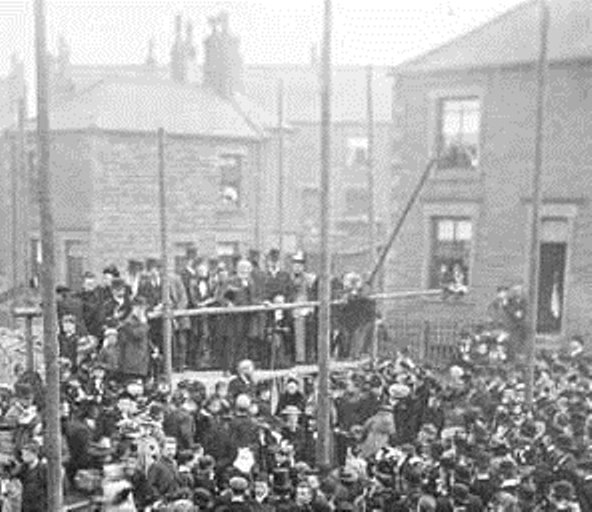
The school had previously been held in a mill shed at Brunswick Mill on Wordsworth Square. For nearly 200 years, the Sunday School movement provided the only free opportunity for illiterate adults to learn to read and write. John Wilson, a local manufacturer and a Quaker, helped to fund the new building. The surrounding area had recently undergone significant housing development so, although classes were held on Sunday, the rest of the week it was used for choir practice, drama, study groups, gymnastics, and meetings of community groups.
Alice taught at the School for over 10 years. She also attended meetings here as President of the Morley Women’s Guild and Treasurer of the Women’s Franchise League.
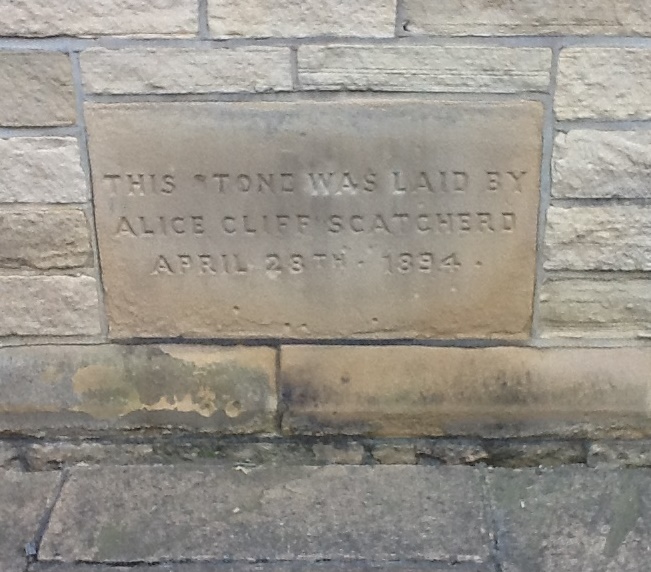
MORLEY OBSERVER, 2 November 1894
THE TOWN COUNCIL AND GUARDIAN ELECTIONS
SPEECHES BY MRS SCATCHERD AND MIRS WIMBOLT
Mrs Scatcherd said:
There are 393 women voters in Morley, 25 of whom are married women, who will be called upon to vote in the election of Guardians. For the first time those married women were not going to be put on one side because they were married. The Women’s Franchise League obtained the vote for those women. Now the women voters must vote for those men who would go in for their own enfranchisement. I will not lift my little finger to secure the return of any man to whatever political party he might belong if he did not say the women should have the vote. If I choose to keep a little shop, or if my husband deserted me and went to America and I maintained the home, I should have a vote. Marriage made no difference to a man’s voting power, so why should it make a difference to a woman’s voting power.
In conclusion, I move the following resolution – that this meeting urges the 393 women householders of Morley to record their votes for such candidates as are in favour of women’s suffrage as well as the good government of the town.
Mrs Wimbolt, a candidate for the Parish Council, said:
Women claim and rightly too, that we ought to have a voice in the affairs of the nation. We claim we have “paid the piper” long enough; it is quite time we should have a choice. We claim also that we have just as much intelligence as men. We have proved that on the School Boards and on the Boards of Guardians, and we prove that when we vote for County Councils and we will prove it when we have a voice in national matters as well as on the District and Parish matters. I do not think it is right that, because I married, I should not have a vote. Married women have as much sense as single women and we contend that where we pay rates and taxes the right of voting should not be withheld from us.
Women make very good Chancellors of the Exchequer at home and I do not believe it will be any different in the Town Council. We claim the right as Englishwomen to advocate anything which is for the benefit of both men and women. Let men and women do all they could to forward the women’s movement. Formerly man and wife were counted as one; now they counted as two. Personally, I will never rest until women are sitting in the House of Commons.
There is also work for women on Boards of Guardians. There are things in the Workhouse that woman can deal with better than men. Women are better able to look after the women and children and to deal with the appointment of matrons. Here in Morley are found half a dozen suitable women ready to sit on the Board of Guardians.
Letter from Alice Cliff Scatcherd The Morley Observer 3 December 1894
“I have again fully considered your invitation that I should allow myself to be nominated as candidate for the post of Poor Law Guardian for Dewsbury Union. That invitation I must with sincere regret decline because other public work claims me, work which I hold to be at the foundation of women’s freedom and well-being.
The Married Women’s Property Act 1883, the Custody of Infants Act 1886, the position of married women under the Parish Councils Bill (1894) are some of the happy results of which it has been my privilege in a measure to promote. Much yet remains to be done; but workers are few who have the courage to insist that no slur or disability shall be placed on women simply because they are lawful wives and mothers. So I must stand to my post.”
Extract from a letter in The Woman’s Signal 30 June 1896
Dear Madam
I think I along with other working-women were at that meeting, thanks to Mrs Scatcherd now of Morley who both taught us to understand the princeples under witch we were govenered and paid our expenses. I shall never forget the awakening, how we used to have Cotage meetings and how we used to sit and liston to that great and good Lady, how she would adapt herself to us. I have been reading about this Lady and the other Ladys, I thought the Pioneers were been forgotten. I do not want to dictate, but I thought it would be very interesting at this point to have Mrs Scatcherd interviewed. When we were at Manchester we were introduced to a great many of the leading women of that day, and it put new life into some of us, so much so that we have taken an interest in all the women’s movements ever since, before then I used to think there was no Bright and shining star for the mill-workers, no goal to attain, only work, work and pay, or the song of the shirt over again, but now after all these yers I can see a better day dawning, what with our women’s co-operative Guilds and chances of informing ourselves, and since then we have got our own worker’s papers so we can express our own sentiments. I send you a few lines from factory times.
I wish you a happy new year.
(Mrs) Eliza Ellis
Batley, Yorkshire
Through the League, Alice attempted to resist the narrowing of the women’s rights movement solely to the franchise by proposing a range of wider social reforms affecting women such as divorce and child custody. However, after the deaths of Richard Pankhurst in 1898 and Jacob Bright in 1899, Alice felt unable to continue alone.
She spoke movingly at Richard Pankhurst’s funeral about his work for women’s equality and contributed £25 to a fund raised to support his widow and children.
Oliver Scatcherd was Mayor of Morley for two terms, from 1898 to 1900 and the responsibilities which this entailed may have contributed to Alice’s withdrawal from suffrage activism. She allowed the League to be incorporated into the new National Union of Women’s Suffrage Societies under the Presidency of Millicent Garrett Fawcett and withdrew from national politics.
However, in 1903, when the School Boards were replaced by Local Education Committees, Alice accepted appointment to the Morley Committee.
However she was forced to resign all her public commitments after suffering a stroke.
Oliver died in 1905 and Alice spent her last year bedridden at Morley Hall, dying on Christmas Eve 1906. At her request her funeral was conducted by the Unitarian Minister from Mill Hill in Leeds. She is buried in the Scatcherd Mausoleum in the grounds of St Mary’s in the Wood Church, Morley, which remains a ruin after a fire in 2010.
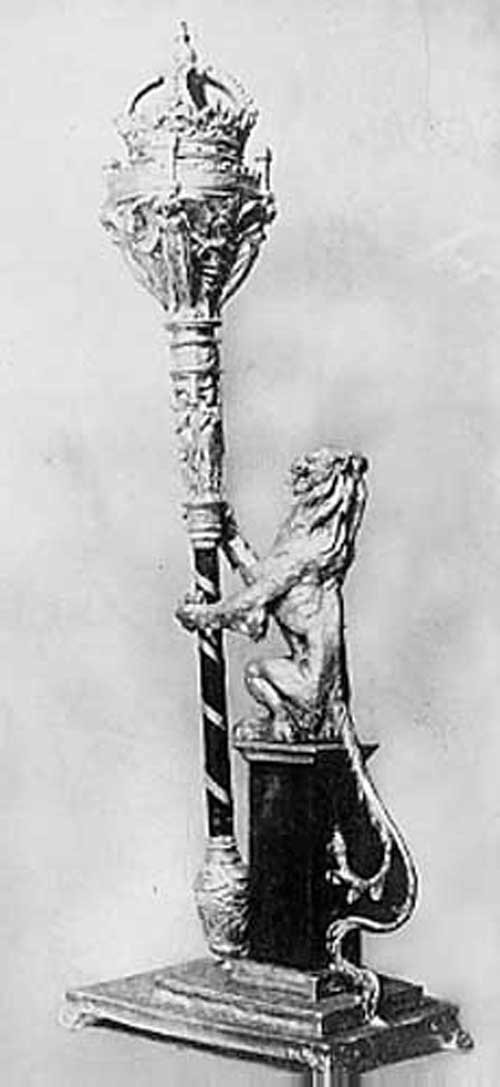
Designed by Walter Crane
Made by Alexander Fisher of Kensington
The mace was presented to Morley Corporation by Alice Cliff Scatcherd on 8 December 1902.
She presented the stand on 9 November 1905 in memory of her husband, Oliver Scatcherd who died 16 September 1905.
Oliver Scatcherd bequeathed to the Borough of Morley the land on which his family home, Morley House, once stood and which now forms Scatcherd Park.
OBITUARY
MRS ALICE CLIFF SCATCHERD
We regret to announce the death of Mrs Alice Cliff Scatcherd, widow of the late Mr Oliver Scatcherd, of The Hall, Morley, which occurred early on Monday morning. Mrs Scatcherd was the daughter of the late Mr Joseph Cliff, of Western Flatts, Wortley, and a member of a large family who have for some generations been prominent in the social and philanthropic life of Leeds and the adjoining districts. She was a woman of great intellectual attainments, and a powerful and gifted public speaker, possessing a delightful store of anecdotes.
In early life Mrs Scatcherd was well known throughout the country for her active support and personal advocacy of all movements having for their object the raising of the position of women, and securing for them the same legal rights and protection of property and person enjoyed by men. Many of the alterations in the position of married women affecting their property and personal rights which are now universally recognised as wise and prudent reforms owed much to her powerful advocacy, at times when such advocacy was far from popular, and entailed great personal courage and self-sacrifice. She was a most faithful helper and friend of the women’s suffrage cause, and was for many years an active member of the Vigilance Association, and also Treasurer of the Women’s Franchise League. Beyond this, she displayed keen interest in the Society for the Prevention of Cruelty to Animals, and was for many years a member of the Committee of the Leeds branch.
During her many years residence in Morley she has take an active part in the life of the town. Along with her husband she founded the Morley & District Nursing Association, of which she was secretary for many years. Prior to its formation they together bore the whole expense of providing district nurses in the borough.
For many years she conducted a large women’s class at the Morley Adult School and took a leading part in the Morley Women’s Guild.
In the years that her husband filled the office of Mayor of the borough she was actively associated with him in civic service, and showed special interest in the children attending the elementary schools. Her great artistic taste was manifested in the handsome challenge shield presented to the borough for the encouragement of athletic sports, and also in the beautiful mace and pedestal presented to the Corporation, the latter being designed by Mr Walter Crane. Her private charity was bountiful and discriminating, and whilst it embraced all classes, she was specially thoughtful in helping young people who showed exceptional ability to pursue more advanced study.
Mrs Scatcherd travelled extensively in many countries, and her contributions to the Press from time to time indicated that she had not visited them merely as a tourist, but as an earnest student of customs, laws and social conditions, anxious to obtain information and education to assist in her public work.
She was deeply interested in musical and artistic subjects. Her energy and striking personality covered a wide range of interest, and touched the life of the district at many points.
For several years Mrs Scatcherd has been in failing health, and her illness assumed a more serious form about a week ago. She was attended by Dr Steele, of Morley, in consultation with Dr Griffith, of Leeds.
The internment is to take place tomorrow (Thursday) in the family mausoleum at St Mary’s Church, Morley.
Yorkshire Post, Wednesday 26 December 1906
The Church of St Mary’s in Wood, Morley as Alice would have known it.
The Scatcherd Mausoleum is the square building on the far right
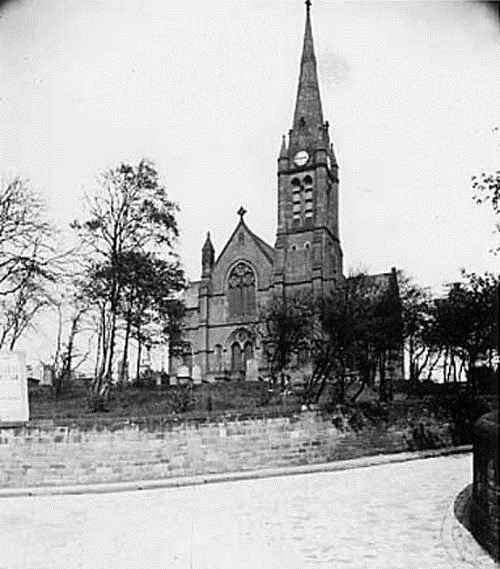
The Church was built on the site of the Old Morley Chapel and held its opening services on 5 September 1878
Photograph taken in 1902 from Coffin Corner
The Scatcherd Mausoleum in the grounds of St Mary’s Church, Morley
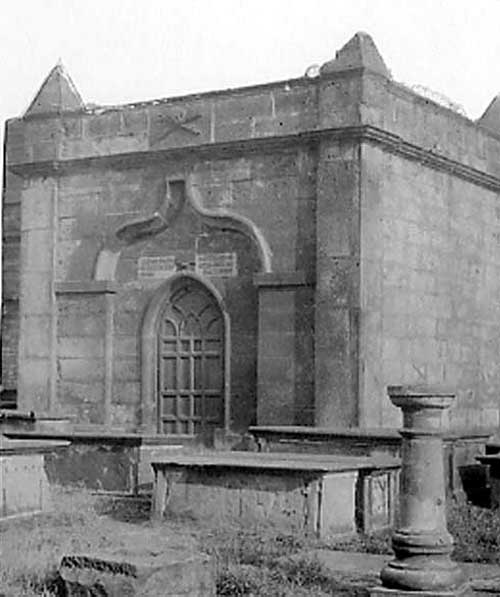
undated photograph.
The mausoleum is now derelict and the church was gutted by fire in July 2010.
“Mrs Alice Cliff Scatcherd, the honorary treasurer of the [Women’s Franchise] League, was a highly sincere and genuine worker. A tall, bony Yorkshire woman of Morley, near Leeds, of substantial means and assured social position, she repudiated as badges of slavery, and refused to wear either a wedding ring or the veil with which every would-be well-dressed woman covered her face in those days. (Mrs Pankhurst then never went out without her veil.) Because this middle-aged lady wore no ring, hotel proprietors many times refused to admit her, when she appeared with her husband, despite her appearance of indubitable respectability, and her staid, unfashionable dress, completed by large, low-heeled, elastic-sided boots. Such was the prudery of the nineteenth-century.”
The Suffragette Movement by Sylvia Pankhurst (1931)
Sylvia Pankhurst set out to prove that the parliamentary vote was won solely by her family and their followers. To do this, she had to play down or write out the achievements of the Victorian campaign.
This patronising paragraph describes a woman who was a close friend and colleague of Sylvia’s parents. Alice remained supportive, both emotionally and financially, of Emmeline Pankhurst and her children after the early death of Richard Pankhurst.
The Scrapbook demonstrates that Alice took a keen interest in fashion. She was a member of the Rational Dress Society, which sought to introduce a more practical and comfortable way of dressing.
The refusal to wear a wedding ring reflects the influence of the Quakers on Alice’s beliefs and principles.
A surprise to learn that women in Britain were expected to veil their faces in the 1880s and 1890s.